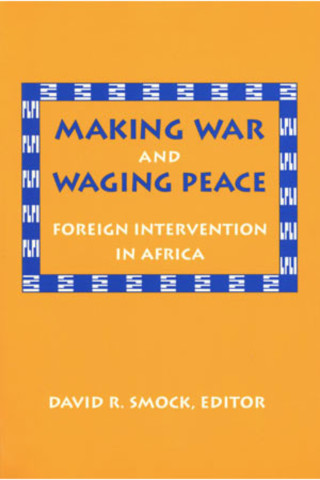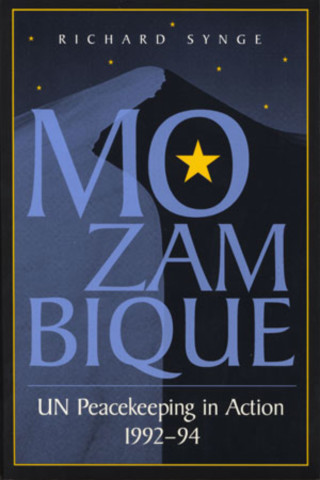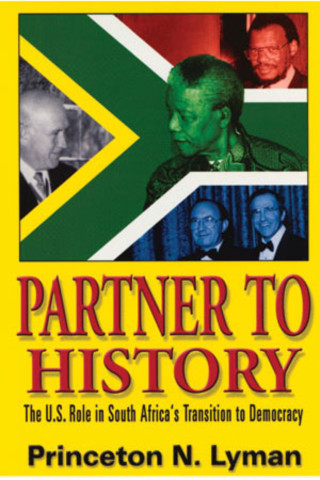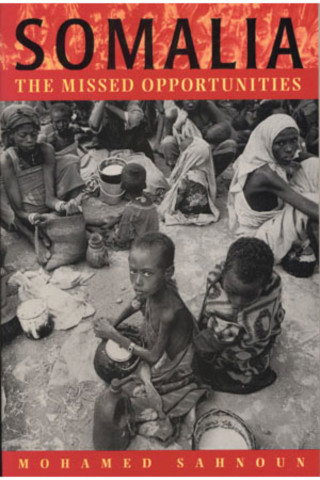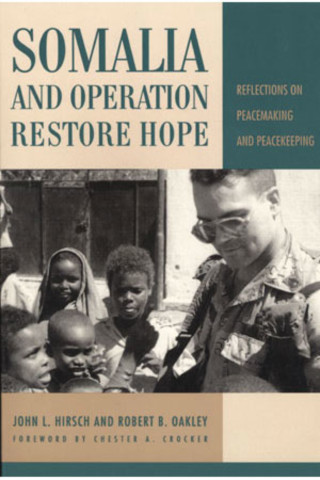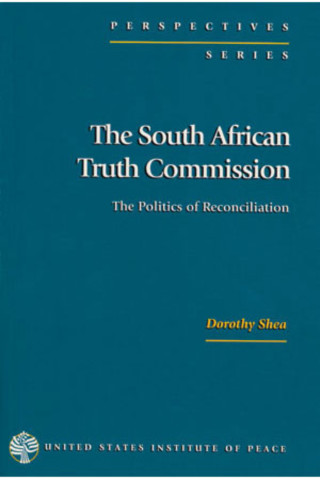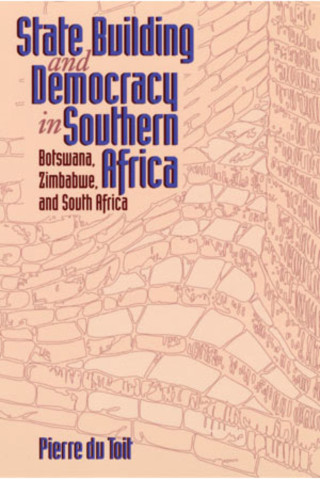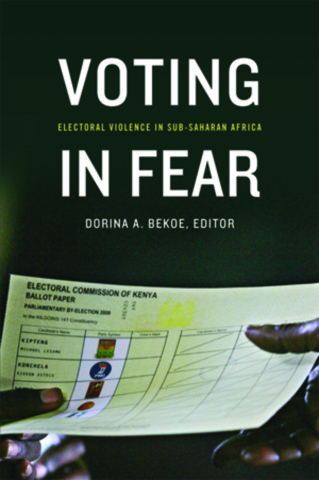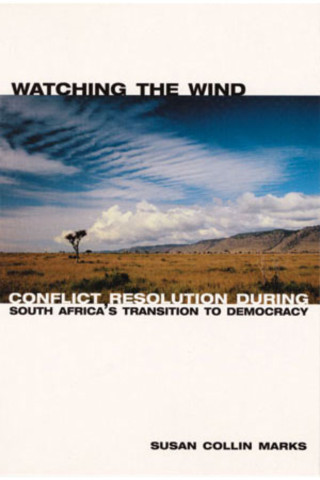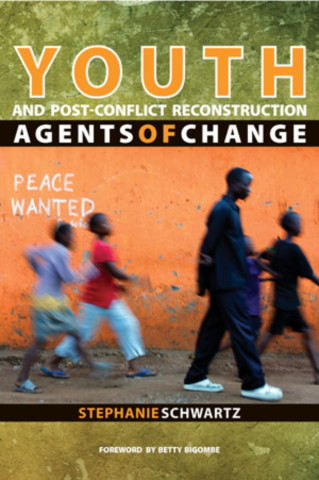Africa
- Sort by
During the past decade or so, Africa has been beset by an extraordinarily high number of wars. Indeed, some two to three million people died because of Africa’s warefare in the 1980’s alone.
That heavy burden of war, most of it originating internally, has been accompanied by frequent external involvement, both in terms of military intervention and through efforts to promote conflict resolution, usually by mediation.
This volume focuses on the role and effectiveness of external intervention in sub-Saharan Africa, primarily during the 1980’s. The authors include a range of Western and African scholars and policymakers with extensive experience in Africa.
The richly detailed case studies examine Angola and Namibia, Ethiopia and Eritrea, Mozambique, and Sudan. Additional essays assess the role of the OAU and summarize French, British, and Belgium military involvement. An afterword by former diplomat Chester Crocker offers several guidelines for promoting peace-making and peacekeeping on the African continent in the future.
By the time it ended in 1992, Mozambique's 15-year civil war had exacted a terrible price. Economically paralyzed, the vast, drought-stricken country was rich only in enmity, landmines, and AK-47s. Into this misery was thrust a multifaceted UN mission, ONUMOZ, to manage the transition from military combat to electoral contest. Remarkably, when ONUMOZ departed two years later, that job was largely done.
This comprehensive account describes how ONUMOZ went about its tasks--assembling and demobilizing troops, providing humanitarian aid, demining, preparing for elections--and assesses how well each was accomplished and why. Richard Synge takes us behind the scenes of the operation, unearthing new information from confidential UN files and from face-to-face interviews with leading players. Even-handed and rigorous, Synge highlights not only the strengths but also the weaknesses of ONUMOZ, and he puts ONUMOZ firmly in its international and regional context.
Among the many lessons ONUMOZ offers future peacekeeping efforts is that success demands the support of an engaged international community and a people eager to make peace work.
A remarkable book about a remarkable time, Partner to History reveals the role played by U.S. diplomacy in South Africa's surprisingly successful transition from apartheid to democracy. Princeton Lyman, the U.S. ambassador during the transition, makes clear that America didn't "own" the transition process-the South Africans did. But U.S. involvement was active and intense. And it made a difference.
Lyman tells an enthralling story of how Washington policymakers and the American embassy used U.S. influence, economic assistance, and political support to help end apartheid without sparking civil war. The book offers candid assessments both of U.S. policy deliberations and of the leading players in the unfolding, unpredictable drama. It takes us behind the diplomatic scenes as well as onto the public stage, as American diplomats strove to facilitate dialogue, encourage reconciliation, and dissuade potential spoilers.
By 1992, starvation, disease, and death had engulfed Somalia and its people. Plagued by the violence of civil war, Somalia had become a country with few resources and great despair—electricity, communications, transportation, health services, and food were all in short supply.
As disaster befell the country, the international community proved unwilling or unable to provide the humanitarian and peacekeeping assistance that was desperately needed. The result, contends Mohamed Sahnoun, UN special representative to Somalia in 1992, was the continued spread of a tragedy that had already reached unthinkable proportions.
In this compelling volume, Sahnoun describes his first-hand experience in Somalia and argues that if the international community—and specifically the United Nations—had intervened earlier and more effectively, much of the catastrophe that unfolded could have been avoided.
In part a vivid personal memoir and in part a case study of multilateral intervention, the book provides concrete examples of how the failure of international intervention in different phases of the crisis in Somalia led to further deterioration. The author also assesses the reasons for the “absence of adequate and timely action” and examines how the United Nations can better fulfill its expanded role in promoting stability and providing humanitarian relief in the future.
The Los Angeles Times describes this volume as one of the two most important postmortems written since the United Nations dismantled its troubled and lamented mission to Somalia.
“Somalia” has become a symbol for the unacceptable costs of humanitarian intervention, for the type of foreign involvement that should be avoided. But the authors of this timely book, themselves key participants in the U.S.-led operation there, argue that substantial good was done—the tide of famine was stayed, hundreds of thousands of lives saved, and steps toward political reconciliation begun. Despite the recent renewal of political violence, the humanitarian situation remains stable.
In launching Operation Restore Hope, the multinational coalition faced a complex, tense, and rapidly unfolding situation. The authors detail how the carefully limited mission achieved its goals, including mutual understanding with the Somalis, by combining political, military, and humanitarian actions. But the authors also describe how different U.S. and UN concepts of the mission and subsequent changes in the mission’s scope led almost inevitably to confrontation.
In the latter half of the 1990s, South Africa’s Truth and Reconciliation Commission (TRC) offered the country the chance to build a better future by facing up to its past. Amid saturation media coverage, victims of human rights abuses told their harrowing stories and perpetrators confessed to horrendous acts. Meanwhile, the commissioners grappled with decisions that would not only apportion responsibility and grant or deny amnesty but also have a profound political and social impact.
To this highly charged, controversial subject, Dorothy Shea brings a rare combination of objectivity, thoroughness, and a firm grasp of both the principles and the political interests at stake.
She begins by investigating the origins of the TRC in South Africa’s transition from apartheid to democracy, and she examines the extent to which it learned from the experiences of earlier, Latin American commissions. Then she focuses on how the politics of the TRC were played out in issues such as amnesty, reparations, and prosecutions. Her report on the TRC offers a generally positive assessment and explains not only how South Africa measured up but also why. Finally, Shea draws lessons from the TRC experience that may help to inform future efforts to shape and establish truth commissions in other transitional societies.
Traditional democratic institutions have not easily taken root in African soil. Too often, attempts at cultivating democratic norms have foundered, leaving anarchy or authoritarianism. What, then, are the chances that South Africa's transition from apartheid to democracy will endure?
With this question in mind, South African political scientist Pierre du Toit probes the conditions under which democracy can grow. He examines three southern African states that, despite similarities, have very different track records: Botswana, perhaps the most successful democracy in continental Africa; Zimbabwe, where a partial democracy is faltering; and South Africa, just beginning it's bold experiment.
Weighing the impact of each country's heritage, ethnic composition, and economic circumstances, du Toit demonstrates that democratic outcomes depend on the nature and strength of the state. Democratic practices are embedded in a broader network of state and societal instiutions; only if these institutions are robust and resilient can democracy flourish.
Nine contributors offer pioneering work on the scope and nature of electoral violence in Africa; investigate the forms electoral violence takes; and analyze the factors that precipitate, reduce, and prevent violence. The book breaks new ground with findings from the only known dataset of electoral violence in sub-Saharan Africa, spanning 1990 to 2008. Specific case studies of electoral violence in countries such as Ghana, Kenya, and Nigeria provide the context to further understanding the circumstances under which electoral violence takes place, recedes, or recurs.
A compelling, inspiring account of peacemaking in action, Watching the Wind takes us to the front lines of South Africa's struggle to manage the tempestuous transition from apartheid to democracy.
When Mandela, de Klerk, and other political leaders launched the 1991 National Peace Accord in a far-reaching effort to staunch political bloodshed and promote consultation and cooperation between bitter adversaries, Susan Collin Marks was one of thousands of South Africans who committed themselves to making the peace process work where it mattered most—at the local level. Over the next three years, Marks and other leaders of the conflict resolution movement adopted and adapted a vast array of tools and techniques: they mediated, facilitated, and counseled; they created forums for open discussion and trained community leaders; they fostered community policing; and they anticipated crises and stood between demonstrators and security forces.
And, as Marks explains, “something extraordinary happened.” The international community had expected a bloodbath, but what it saw instead was a near-miraculous process of negotiation and accommodation. With passion and eloquence, the author captures the drama, the personalities, and the heroism of this grassroots peace process.
In Youth and Post-Conflict Reconstruction: Agents of Change, Stephanie Schwartz goes beyond these highly publicized cases and examines the roles of the broader youth population in post-conflict scenarios, taking on the complex task of distinguishing between the legal and societal labels of “child,” “youth,” and “adult.”

